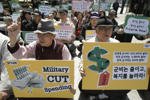An extra two days for filing taxes? Why, more time to protest.
In 2009, the Tax Day rallies crystallized a tea party moment. Three years later, the rallies continue, if not quite with the riled-up, pent-up outrage from the Bush-era bailouts and the Obama-sponsored health-care reform bill. If a Tax Day rally isn’t your cup of tea, other movements — Occupy Wall Street and the Global Day of Action on Military Spending — have co-opted April 17 to protest Uncle Sam’s perceived subsidies for billionaires, corporations, and the military.
That won’t be the end of the protests: The occupy movement is calling for a second general strike on May Day, to launch the 99% Spring. And if you prefer to protest with your vote, there are plenty of elections left in which these movements loom if not large, then persistent, behind the scenes.

Wisconsin tax day tea party rally
Tax Day rallies, tea party-style: Many tea partyers, from Bend, Ore., to Duluth, Minn., to Orlando, Fla., took the weekend to protest. Conservative breakout star Joe the Plumber, who’s running for Ohio’s 9th congressional district, spoke in Cleveland. The gathering in Madison served double duty to show support for Wisconsin Gov. Scott Walker, who faces a June 5 recall election. Boston had competing tea party rallies, but in a case that more may not be merrier. The executive director of Citizens for Limited Taxation explained the conflict, emblematic of tea party infighting:
Unfortunately, the founding Greater Boston Tea Party won’t be holding its annual rally on Boston Common; that event was hijacked by social conservatives who disagree with the tea party’s singular focus on fiscal issues and want to use it to advance their own agenda. By getting a city permit before the GBTP could finalize theirs, the “other tea party,” or what I call the Kool-Aid party, forced the fiscal conservatives to celebrate Patriots’ Day elsewhere. (April 15, Eagle-Tribune)

Occupy Wall Street tax day rally
Spreading the wealth, occupy-style: Labor unions and progressive organizations like MoveOn.org have scheduled nearly 300 rallies to “tell the 1% that it’s time to pay their fair share.” The notion of taxing wealthy individuals at the same rate as other American taxpayers failed politically right before Tax Day in a 51-45 Senate vote against the so-called Buffett rule. (The name came about after Warren Buffett, the third-wealthiest man in the world, said that “we megarich continue to get our extraordinary tax breaks.”)
As part of its 99% Spring rewakening, Occupy Wall Street’s April 17 demonstrations are aimed less at Buffett’s megarich pals and more at corporations. Not that the movement went into hibernation after its autumn camp-outs. Harvard’s Nieman Watchdog tallied the movement’s various winter occupations aimed at stopping foreclosures, blocking evictions, drawing attention to student debt, decrying voter ID law laws, showing support for Trayvon Martin, and observing the second anniversary of the Supreme Court’s controversial Citizens United ruling.

2011 Global Day of Action
A Global Day of Action on Military Spending (GDAMS) has also been scheduled “to coincide with the release of the Stockholm International Peace Research Institute’s (SIPRI) new annual figures on world military expenditures.” (Demilitarize.org) SIPRI’s latest numbers estimate $1.74 trillion in worldwide military spending, the first time since 1998 that spending leveled out due to budget cuts. The United States remains the top spender at $8.7 billion.
On April 17, activists in 40 countries and more than 100 cities around the world will participate in the second annual Global Day of Action on Military Spending. There will be street theater in Dhaka, demonstrations in Istanbul, a parliamentary debate in Yaoundé, protests against military bases in Okinawa, a peace village in Oslo, a high-level seminar at the United Nations in Geneva, a flash mob in Oakland, Tax Day leafleting in Bethlehem, Penn., a “walk of shame” in Washington, D.C., and much much more. See GDAMS’s complete list of action events. (April 10, Huffington Post)
Tea party anniversary: Tax Day has become a health check of sorts for the tea party, as pundits take its measure in terms of membership numbers and makeup, as well as its popularity. Attendance in places such as Kansas and Jefferson cities in Missouri and Canton, Ohio, were noticeably smaller than in previous years. Polls from ABC and the Pew Research Center show increased public disinterest or disagreement with its philosophies. Regardless, tea party politics, which helped to “fuel the largest turnover in the U.S. House in more than 70 years,” have been grafted into the Republican base.
Smaller rallies, Missouri Rep. Todd Akin told PoliticMo, simply mean that activists are “running for office … and following the political process” in lieu of attending protests. Academics agree: Harvard Professor Theda Skocpol, co-author of “The Tea Party and the Remaking of Republican Conservatism,” told the Associated Press that despite a drop of 1,000 tea party groups to 600, its remaining numbers show a “good survival rate.” The tea party purpose wasn’t to create an actual party, but to channel fury at big government.
[See Tea Party origins in “10 Obsessions of 2010,” Yahoo! Year in Review ]
How to protest, occupy-style: Spring has also been a time for the occupy movement’s own health check. At its six-month mark, AP did a roundup on successful actions, from getting bills passed to staving off foreclosures. Yet its most notable influence, besides channeling anticorporate rage, may be the art of the protest itself. Progressive groups and labor unions, to revive and reinvent themselves, have been undergoing a reported 900 occupy-style activist training sessions.
Pressured by Occupy Wall Street, the coalition’s members — including MoveOn, the United Auto Workers, Greenpeace, and Rebuild the Dream — are looking to move from more passive actions such as online petitions, calls to Congress, and town square rallies to more aggressive occupy-style targets and tactics.
It’s a reflection of how the occupy movement has forced some institutional liberal groups to radicalize — or at least appear to — to meet the new fervent climate, as stubborn unemployment and yawning inequality push activism outside the confines of traditional electoral politics. (April 9, Huffington Post)

Occupy Wall Street versus Tea Party
Doth they protest too much? Surface similarities between the two movements have invited inevitable comparisons. Disenfranchised citizens inspired by a media campaign (Adbusters vs. Rick Santenelli of CNBC) coming together to express frustration against institutions — and both, initially, without a clear platform.
Differences and strategies, of course, run deep (the tea party was quick to make distinctions clear). Yet compare these two statements:
- An Occupy Atlanta organizer countering the notion that progressive organizations have co-opted the occupy movement: “The movement has co-opted them. That’s the sign of the times.” (Huffington Post)
- A Harvard professor on the tea party’s influence: “They’ve taken over the Republican Party, lock, stock, and barrel.” (AP)
One thing is as sure as death and taxes: Both movements will be cranking up their revolutionary zeal from Tax Day through Election Day.
